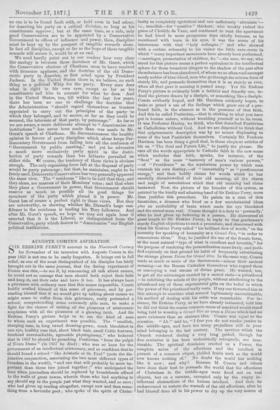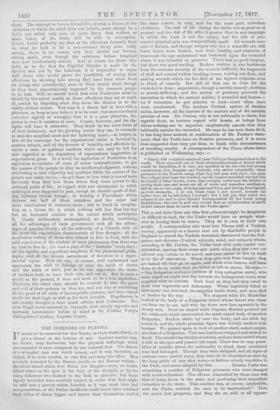AUGUSTE COMTE'S ASPIRATION.
SIR ERSKINE PERRY'S account in the Nineteenth Century for November of his interview with Auguste Comte in the year 1863 is not one to be easily forgotten. It brings out in full relief, as one of the most distinguished of his disciples has lately brought out in the same journal, that the daring experiment of Comte was this,—to see if, by renouncing all talk about causes, he could not so manage that men should both reject their faith and keep it, eat their cake and have it too. It has always been a grievance with ordinary men that this seems impossible. Comte boldly availed himself of this sense of grievance, and by per- suading himself that if we would give up talking about causes we might cease to gaffes from this grievance, really persuaded a school, comprehending some extremely able men, to make a fight for the chance of uniting all the pleasures of aristocratic scepticism with all the pleasures of a glowing faith. And Sir Erskine Perry's picture helps us to see the kind of man to whom such an experiment was possible. The "
stooping man, in long tweed dressing-gown, much bloodshot in one eye, healthy rose tint, short black hair, small Celtic features, forehead unremarkable, agreeable physiognomy," who believed that in 1867 he should be preaching Positivism "from the pulpit of Notre Dame" (in 1857 he died) ; who was so keen for the government of an intellectual aristocracy, and so confident that he should found a school " like Aristotle or St. Paul" (note the dis- junctive conjunction, associating the two most different types of founders in the world), "and one that will probably be more im- portant than those two joined together ;" who anticipated the time when journalism should be replaced by broadsheets affixed to the walls of great towns, wherein those who had anything to say should say to the people just what they wanted, and no more ; who had given up reading altogether, except now and then some- thing from a favourite poet ; who spoke of the spirit of Christ-
ianity as completely egotistical and not sufficiently altruistic '— i.e., unselfish—for " positive " thinkers ; who weekly visited the grave of Clotilde de Vaux, and continued to rent the apartment he had hired in more prosperous days chiefly because, as he mentioned with tears in his eyes, it was the scene of his intercourse with that "holy colleague ;" and who showed with a certain solemnity to his visitor the little ante-room in which " many important sacraments have already been performed, —marriages, presentation of children, &o."—the man, we say, who stood for this picture seems a perfect equivalent in the intellectual sphere for those tenacious clingers to the shadow of the past after the substance has been abandoned, of whom we so often read amongst needy nobles of blue-blood, men who go through the solemn form of stately life, and persuade themselves that it is as stately as ever, when all that gave it meaning is passed away. Yet Sir Erskine Perry's picture is evidently both a faithful and friendly one, in- deed the picture drawn by a disciple, or something like a disciple. Comte evidently hoped, and Mr. Harrison evidently hopes, to make as grand a use of the feelings which grow out of a pro- found faith, in the absence as in the presence of that faith. And this he called Positivism,—that is, sticking to what you have got in human nature, without troubling yourself as to its roots. It was Professor Huxley, we think, who first described Positivism as Catholicism without God. And we are disposed to think that that epigrammatic description was by no means displeasing to some of the best Positivists themselves. Certainly Mr. Frederic Harrison has been doing a good deal, in those eloquent articles of his on "The Soul and Future Life," to justify the phrase. He uses all the words appropriate to Catholic faith in the new sense which excludes that faith, speaks, for instance, of the "Soul" as the mere "harmony of man's various powers," —of " Providence " as the mysterious power by which man controls his own destiny,—of " immortality " as " posthumous energy," and then boldly claims for words which he has carefully disembowelled of their old meaning, all the charm and magic of associations which that old meaning had alone bestowed. Now, the picture of the founder of this system, as painted by the kindly and admiring hand of Sir Erskine Perry, more than justifies this procedure. He paints us a man of thin fanaticism, a dreamer who lived on a few unsubstantial ideas plus an excitability of brain which made the eye bloodshot and the unreal seem real. Comte thought it a duty to personify,' after he had given up believing in a person. He discoursed at great length to Sir Erskine Perry, in reply to that gentleman's sturdy English objections to such a procedure, and discoursed with what Sir Erskine Perry called " his brilliant flow of words," on the necessity for speaking of humanity as a Grand Etre, " in order to concentrate ideas." Nay, he justified the use of the female form, as the most natural "type of what is excellent and loveable," for the purpose of rendering the personification more lively, and justi- fied expressly on that ground his habit of frequently substituting the strange phrase Diesse for Grand tire. In the same way, Comte made as much or more of the Sacraments—minus their ancient meaning—as the Roman Catholics themselves who regard them as conveying a real stream of divine grace. He wanted, too, to get all the advantages exerted by a sacred caste—a priesthood —in subduing the minds of the people, without attributing to the priesthood any of those supernatural gifts on the belief in which the power of the priesthood really rests. If any one thwarted him in this attempt to combine what seemed legitimately uncombinable, his method Qf dealing with his critic was remarkable. For in- stance, Sir Erskine Perry, as we have already intimated, told him he did not think the coarse common-sense of mankind would stand being told to worship a Grand Etre or even a Ddesse which had no more existence than an abstract idea. Comte was equal to the occasion, 4' Ah !" said he, "I fear you do not render justice to the middle-ages, and have too many prejudices still in your mind belonging to the last century. 'The services which the Church rendered during a very long period, though for five centuries it has been undoubtedly retrograde, are ines- timable. The spiritual dominion erected as a Power, the complete union of the affections and the intellect in pursuit of a common object, yielded fruits such as the world now knows nothing of." No doubt the world has nothing like it now ; and why? Because M. Comte and others have done their best to persuade the world that the affections of Christians in the middle-ages were fixed not on real objects, but on a vacuum, occupied only by the empty in- tellectual abstractions of the human intellect. And then he endeavoured to restore the warmth of the old affections, after he had himself done all in his power to dry up the very source of them. The attempt to love a Grand Etre, or even a Deesse, in the existence of which the mind does not believe, must always be a futile one which only men of more fancy than realism, or some lesion of the brain, will be able to accomplish. Comte would probably say that as the affections formerly fixed on what he held to be a non-existent Deity were really strong, there is no reason why they should not become strong again, even though the existence, before imagined were now intellectually denied. And of course for those who hold, as we do, that the frightful blunder is made by the -deniers and not by the believers, it is impossible to argue with those who would prove the possibility of strong ideal affections by showing bow strong they have been when fixed -on beings who (mistakenly) seem to them merely ideal, though as they hold, superstitiously supposed by the common people to be real. Still, we should think that even Positivists must be struck by the actual results to those affections they say so much of, caused by dispelling what they deem the illusion as to the reality of their objeet. You may in a dream fall in love with a phantom, so long as you believe it to be real ; but once convinced (whether rightly or wrongly) that it is a pure phantom, the power to love it vanishes at once. Comte, however, and his dis- ciples will have it otherwise. They think by the mere force of of their insistency, and the glowing words they use, to reconcile in man the sceptical mind and the believing heart,—to inspire in him all the contempt for the supernatural which is fostered by modern science, and all the fervour of humility and affection to- wards a caste of spiritual teachers which can only be felt for anon regarded as the depository of supernatural inspiration or supernatural grace. In a word, the aspiration of Positivism is an aspiration to combine all sorts of moral contradictions ; to get the masses of the people to obey an intellectual oligarchy, without attributing to that oligarchy any qualities which the masses of the -people can really revere,—to get them to love what is unreal more fervently than they love those whom they come across in the ordinary paths of life ; to regard with awe sacraments in which nothing is ever supposed to pass, except an electric spark of feel- ing between human beings ; to worship a Providence whose decrees are half of them mistakes, and the other half mere conclusions of common-sense ; and to dwell in imagina- tion on a future life in which nothing will live that has any but an historical relation to the nature which anticipates it. Comte deliberately contemplated, no doubt, combining all the advantages of caste government with all the advan- tages of popular liberty ; all the authority of a Church, with all the scorn for superstition characteristic of free thought; all the meditative ecstasy of those who wished to live in God, with the cold conviction of the student of more phenomena that there was no God to live in ; (he read a page of the " Imitatio" every day) ; all the rigidity and superficial simplicity of the phenomenal philo- sophy, with all the devout earnestness of devotees to a super- natural regime. Now we can, of course, well understand and appreciate the wish to indulge at once the habit of doubt and the habit of faith, just as we can appreciate the desire of children both to have their cake and eat it. But in such a world as the present, it does not seem to be a wise aspiration, Thinkers, like other men, should be content to take the good and evil of their systems as they are, and not aim at combining all the good of all sorts of incompatible systems, and then expect credit for their logic as well as for their breadth. Hegelianism is not usually thought to have much affinity with Conateism. But even Hegel never assumed to reconcile such utterly opposite and mutually inconsistent habits of mind as Sir Erskine Perry's distinguished teacher, Augusto Comte.







































 Previous page
Previous page